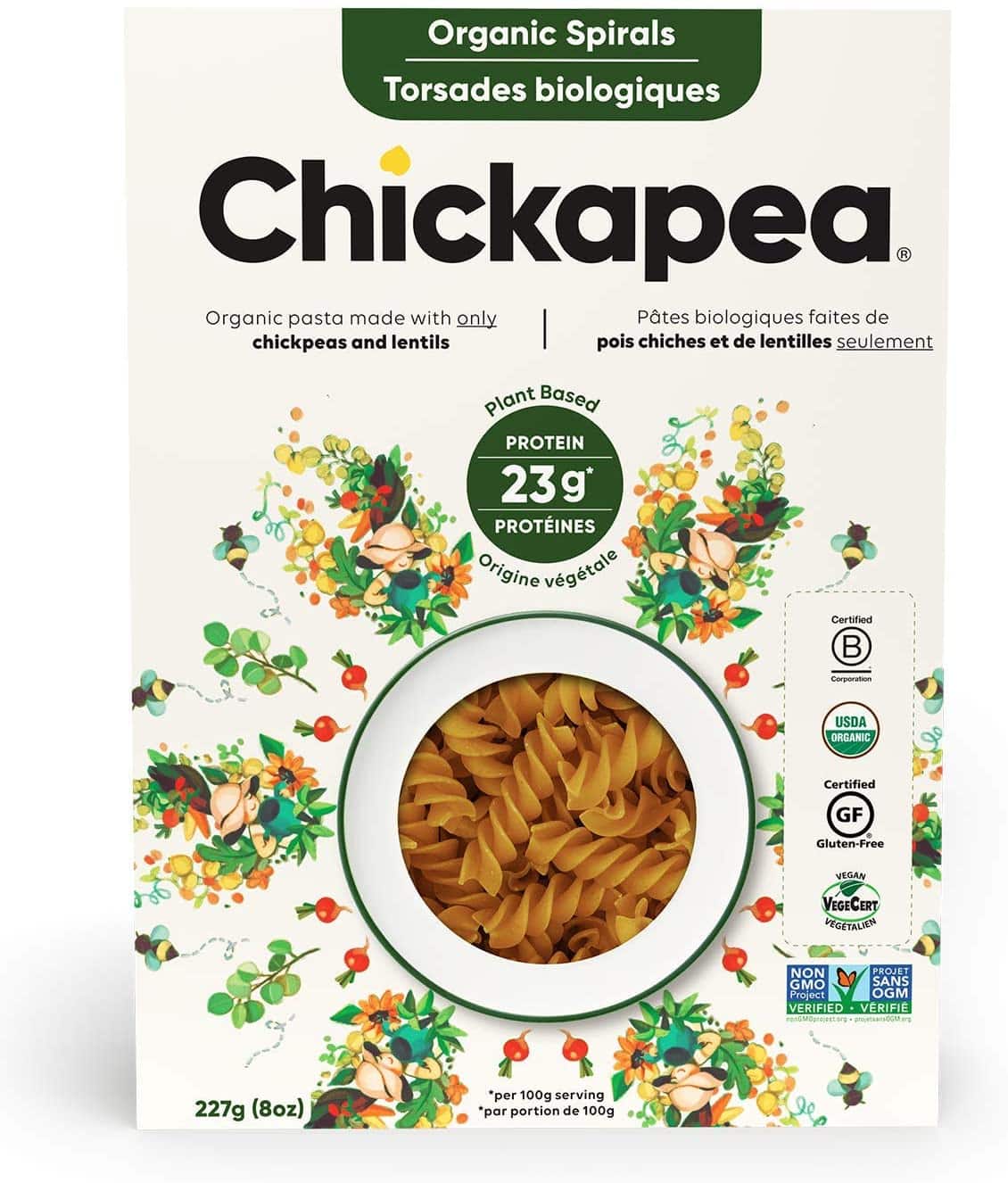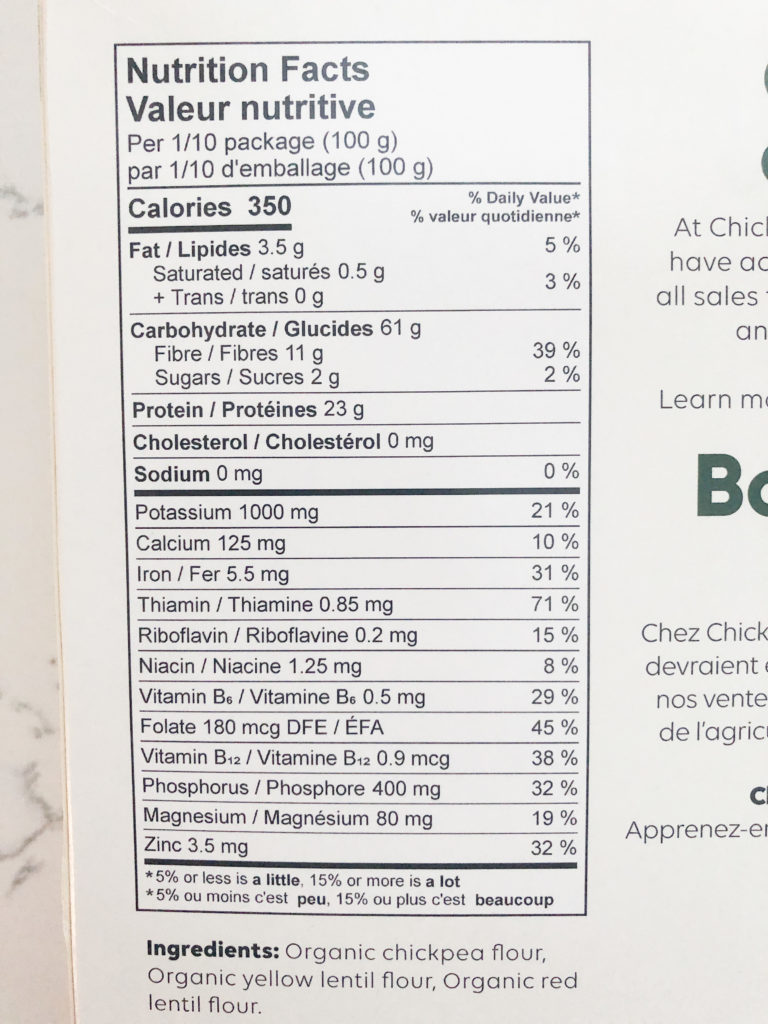This Chickapea Pasta Dietitian Review will help you decide if Chickapea pasta is nutritionally sound and lives up to its marketing claims. Read on for our dietitian review of taste, nutritional properties, ingredients, use, cost, and overall versatility before making your decision.
Interested in learning more about the different types of pasta? Check our post here for all you need to know about the different types of pasta.
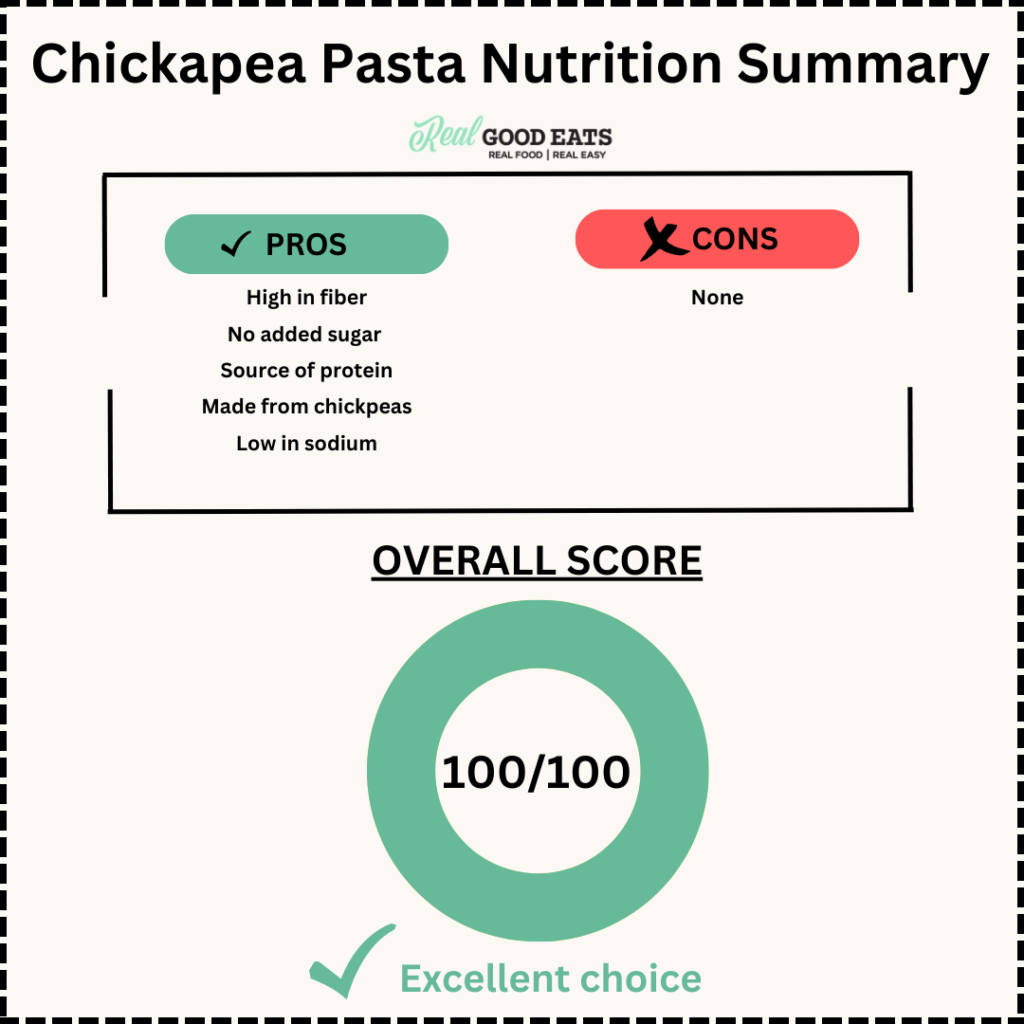
Read more about our Food Nutrition Score here!
About Chickapea Pasta
Chickapea pasta is pasta made with a combination of lentil and chickpea flour.
According to their website, Chickapea was created in 2015 by Shelby Taylor, a former health food store owner and mom looking to provide a convenient and healthy food option for families dealing with time constraints, picky eating, allergies, and health issues.
Nutrition or marketing claims:
On the front page of the Chickapea website, Chickapea states that “one serving of Chickapea has as much protein as 3oz chicken or fish”
They list on the front of their packaging that Chickapea pasta is “Organic pasta made with only chickpeas and lentils”
Taste & Texture
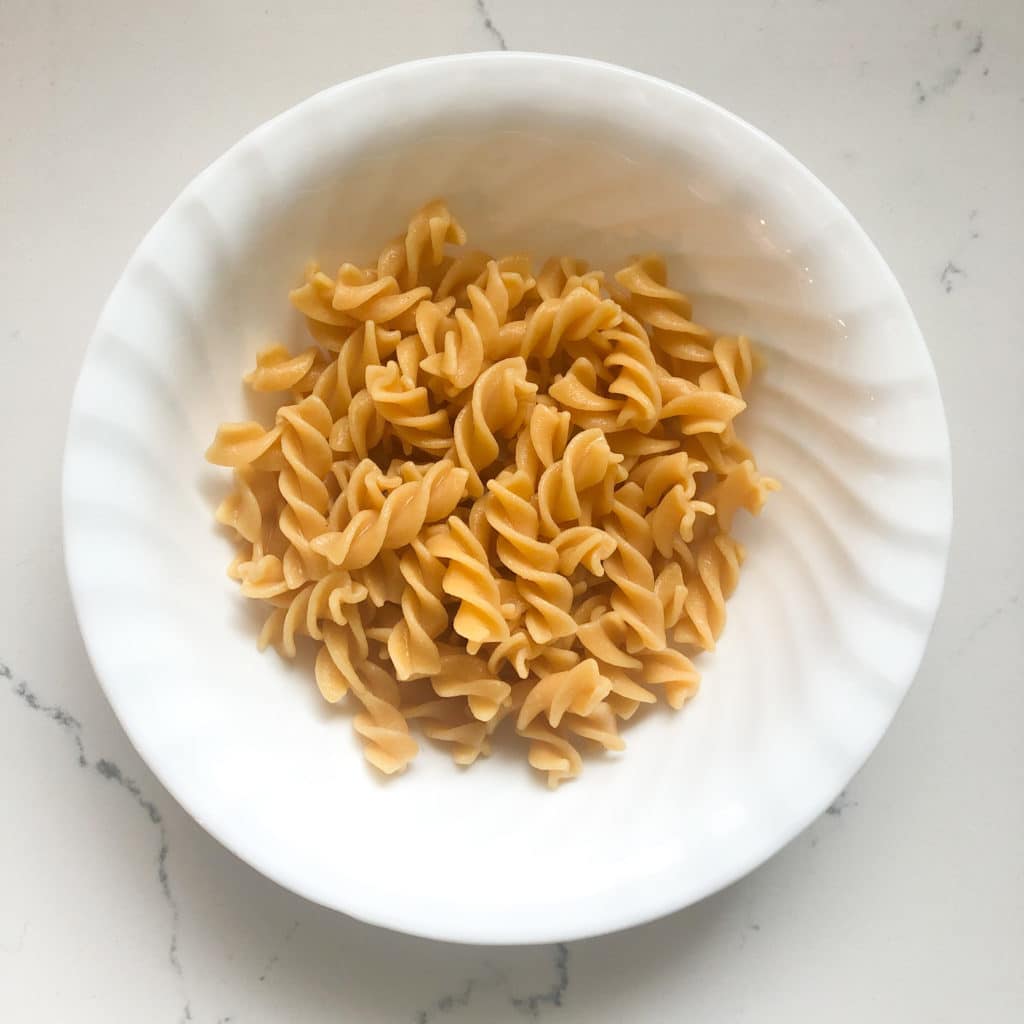
Chickapea pasta has a chewy texture and tastes like chickpeas. We found that Chickapea pasta has a gummier texture than traditional wheat pasta. However, according to the Chickapea website, the resulting texture of Chickapea pasta after cooking depends on the amount of water used during cooking. For best results, Chickapea pasta should be cooked using more water than traditional pasta, as it loses more starch during boiling.
We also found that Chickapea pasta is easy to overcook and falls apart if boiled for too long.
Chickapea Pasta – Dietitian Review
Ingredients
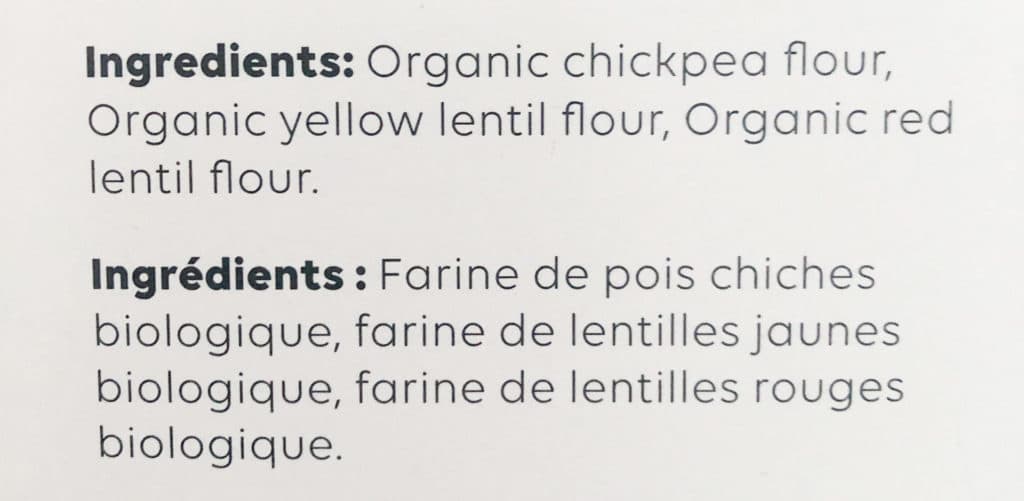
Organic chickpea flour: made from grinding or milling whole chickpeas into fine flour.
Yellow and red lentil flour: made from grinding or milling whole lentils into fine flour.
Priority allergens:
Chickapea pasta is free from priority allergens*.
*Note: always check the nutrition label for up-to-date allergen information.
Nutrition Profile
Note: since the only ingredients in this product are chickpea and lentil flour, the nutrients listed below are coming from these ingredients only. To put this into perspective, we have provided a comparison of Chickapea pasta vs. a traditional wheat pasta.
Serving size: 100g (about 1.25 cups dry). This may be a larger portion than some individuals with smaller appetites would consume per sitting. This is slightly larger than the portion size on most pasta labels, which is typically ~85g.
Calories: 350 calories per serving. This is similar to an equivalent portion of traditional wheat-based pasta.
Fat: 3.5g. This is slightly higher than the fat content of traditional wheat pasta.
Carbohydrate: 61g. This is slightly less than what you will find in an equivalent portion of wheat pasta.
Fibre: 11g. This is a significant amount of fibre and more than double the amount found in traditional wheat pasta.
Sugar: 2g. This is similar to traditional wheat pasta.
Protein: 23g. This is a significant amount of protein, providing ~77% more protein than traditional wheat pasta.
Other nutrients: Chickapea pasta is a good source of calcium, providing 125mg per serving. This is significantly higher than traditional wheat pasta, which provides ~20mg per serving. Chickapea pasta is also an excellent source of B vitamins, magnesium, zinc, and potassium. Most notably, Chickapea pasta is an excellent source of iron, with a whopping 5.5mg per serving.
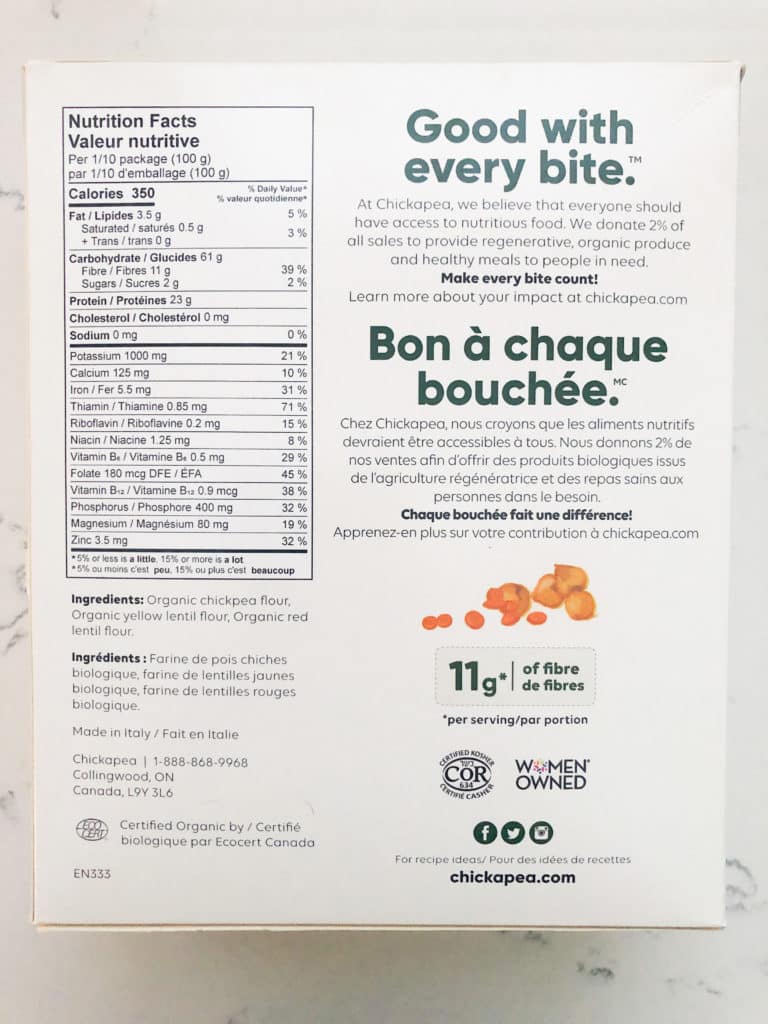
Cost
Chickapea pasta is available for $4.97-$5.99 per 227g box in Ontario stores. This is $2.19-$2.29 per 100g serving. This is more than most wheat-based pasta on the market but is comparable to specialty pasta, such as gluten-free, ancient grain, or other legume-based options.
Chickapea Pasta – Dietitian Review
Is Chickapea pasta healthy?
Yes. Chickapea pasta is an excellent option for those unable to consume traditional wheat pasta, or those looking to include more plant-based protein in their diet. Made from only chickpea and lentil flour, Chickapea pasta is loaded with the nutritional benefits of these legumes. One of the main differences between Chickapea pasta and traditional wheat pasta is its protein content. Chickapea pasta provides 23g of plant protein per serving, making it an excellent way to increase the amount of plant-based protein in your diet.
Chickapea pasta has a similar amount of carbohydrate as traditional wheat pasta, however, Chickapea pasta has significantly more fibre per serving. In fact, 18% of the total carbohydrate from Chickapea pasta is from fibre, compared to 8% in traditional wheat pasta.
Chicakpea pasta also provides a wide range of vitamins and minerals, most notably 5.5mg of iron, and 0.9mcg of B12 per serving, making it an excellent option for those following a plant-based diet who may otherwise struggle to get enough of these nutrients.
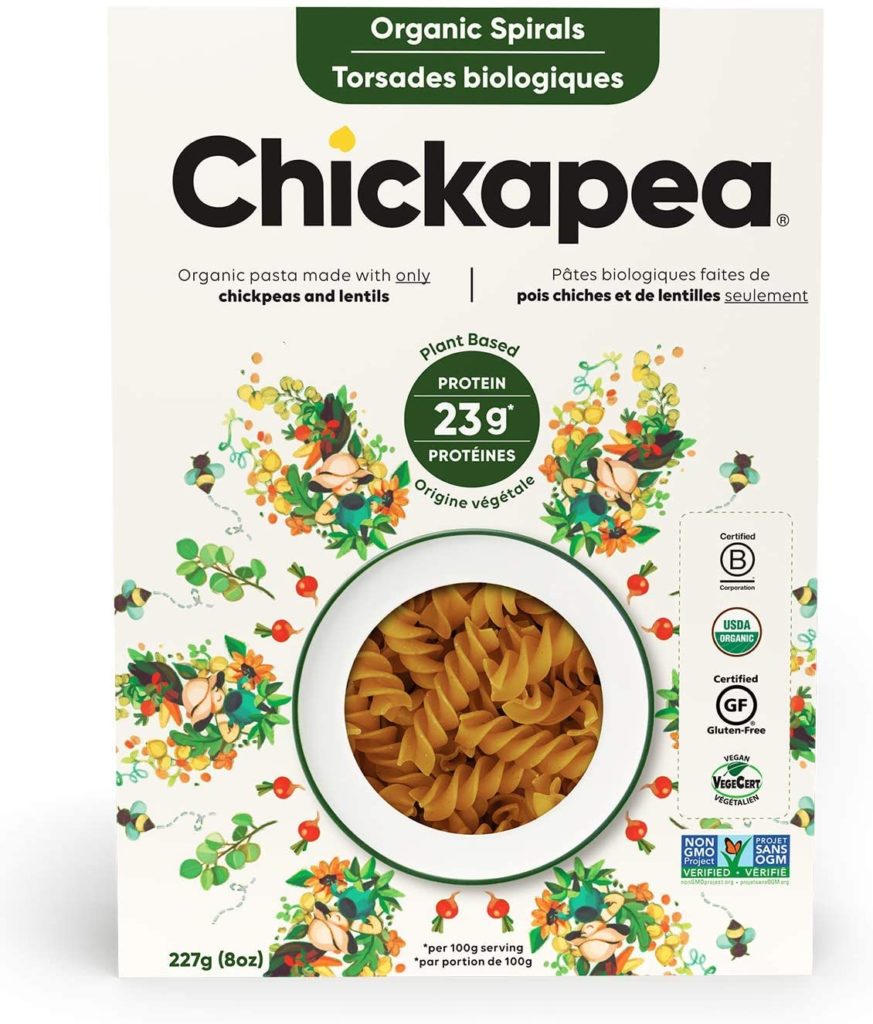
Does Chickapea pasta live up to its marketing claims?
Yes. Chickpea pasta is a high-protein pasta option made with only chickpeas and lentils. It’s suitable for those who cannot tolerate traditional pasta or anyone looking for a quick plant-based protein source to add to their meals.
Chickpea pasta provides 23g of protein per 100g serving, comparable to the protein found in 3oz of meat. It’s important to note that 100g of Chickapea pasta is equivalent to 1 1/4 cups of dry pasta, which may be more than some individuals consume per sitting. On the other hand, 3oz of chicken or fish is much smaller in volume, so we don’t feel this is necessarily a fair comparison.
Frequently Asked Questions
Is chickpea pasta a good carb?
Yes. The carbohydrate in Chickapea pasta is from chickpeas and lentils and can be considered a source of complex carbohydrates. 18% of the total carbohydrate content is from fibre, which is much higher than wheat pasta.
Is chickpea pasta hard to digest?
Chickpeas and lentils contain oligosaccharides and can be difficult to digest for some people. Those with Irritable Bowel Syndrome, for example, may not tolerate legumes such as chickpeas and lentils.
Does chickpea pasta give you gas?
Chickpeas and lentils contain oligosaccharides. When fermented in the large intestine, these oligosaccharides produce gas. Some people may find that their digestive system will adjust to higher levels of oligosaccharides if consumed regularly.
Is chickpea pasta good for weight loss?
Chickpea-based pasta is an excellent option for those with weight loss goals. It is high in protein and fibre, which can help you feel fuller for longer.
Is Chickapea pasta gluten-free?
Yes, Chickapea pasta is gluten-free.
Is Chickapea pasta dairy-free?
Yes, Chickapea pasta is dairy-free.
Is Chickapea pasta vegan?
Yes, Chickapea pasta is considered vegan.
How do I use Chickapea pasta?
You can also use Chickapea pasta as your protein source in meals, such as a pasta salad, or this Easy One-Pot Frozen Broccoli Pasta recipe.

